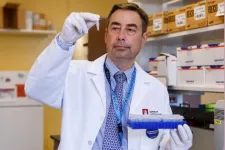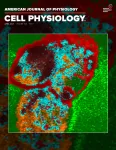INFORMATION:
This research was supported by the National Institutes of Health under Award Number 1DP20D007363 and R01mh117431 and a VA Merit Award 2I01CX000139. The content is solely the responsibility of Indiana University School of Medicine and does not necessarily represent the official views of the National Institutes of Health or the VA.
IU School of Medicine researchers develop blood test for depression, bipolar disorder
2021-04-08
(Press-News.org) INDIANAPOLIS--Worldwide, 1 in 4 people will suffer from a depressive episode in their lifetime.
While current diagnosis and treatment approaches are largely trial and error, a breakthrough study by Indiana University School of Medicine researchers sheds new light on the biological basis of mood disorders, and offers a promising blood test aimed at a precision medicine approach to treatment.
Led by Alexander B. Niculescu, MD, PhD, Professor of Psychiatry at IU School of Medicine, the study was published today in the high impact journal Molecular Psychiatry . The work builds on previous research conducted by Niculescu and his colleagues into blood biomarkers that track suicidality as well as pain, post-traumatic stress disorder and Alzheimer's disease.
"We have pioneered the area of precision medicine in psychiatry over the last two decades, particularly over the last 10 years. This study represents a current state-of-the-art outcome of our efforts," said Niculescu. "This is part of our effort to bring psychiatry from the 19th century into the 21st century. To help it become like other contemporary fields such as oncology. Ultimately, the mission is to save and improve lives."
The team's work describes the development of a blood test, composed of RNA biomarkers, that can distinguish how severe a patient's depression is, the risk of them developing severe depression in the future, and the risk of future bipolar disorder (manic-depressive illness). The test also informs tailored medication choices for patients.
This comprehensive study took place over four years, with over 300 participants recruited primarily from the patient population at the Richard L. Roudebush VA Medical Center in Indianapolis. The team used a careful four-step approach of discovery, prioritization, validation and testing.
First, the participants were followed over time, with researchers observing them in both high and low mood states--each time recording what changed in terms of the biological markers (biomarkers) in their blood between the two states.
Next, Niculescu's team utilized large databases developed from all previous studies in the field, to cross-validate and prioritize their findings. From here, researchers validated the top 26 candidate biomarkers in independent cohorts of clinically severe people with depression or mania. Last, the biomarkers were tested in additional independent cohorts to determine how strong they were at predicting who is ill, and who will become ill in the future.
From this approach, researchers were then able to demonstrate how to match patients with medications--even finding a new potential medication to treat depression.
"Through this work, we wanted to develop blood tests for depression and for bipolar disorder, to distinguish between the two, and to match people to the right treatments," said Niculescu. "Blood biomarkers are emerging as important tools in disorders where subjective self-report by an individual, or a clinical impression of a health care professional, are not always reliable. These blood tests can open the door to precise, personalized matching with medications, and objective monitoring of response to treatment."
In addition to the diagnostic and therapeutic advances discovered in their latest study, Niculescu's team found that mood disorders are underlined by circadian clock genes--the genes that regulate seasonal, day-night and sleep-wake cycles.
"That explains why some patients get worse with seasonal changes, and the sleep alterations that occur in mood disorders," said Niculescu.
According to Niculescu, the work done by his team has opened the door for their findings to be translated into clinical practice, as well as help with new drug development. Focusing on collaboration with pharmaceutical companies and other doctors in a push to start applying some of their tools and discoveries in real-world scenarios, Niculescu said he believes the work being done by his team is vital in improving the quality of life for countless patients.
"Blood biomarkers offer real-world clinical practice advantages. The brain cannot be easily biopsied in live individuals, so we've worked hard over the years to identify blood biomarkers for neuropsychiatric disorders," said Niculescu. "Given the fact that 1 in 4 people will have a clinical mood disorder episode in their lifetime, the need for and importance of efforts such as ours cannot be overstated."
ELSE PRESS RELEASES FROM THIS DATE:
Asteroid crater on Earth provides clues about Martian craters
2021-04-08
The almost 15-million-year-old Nördlinger Ries is an asteroid impact crater filled with lake sediments. Its structure is comparable to the craters currently being explored on Mars. In addition to various other deposits on the rim of the basin, the crater fill is mainly formed by stratified clay deposits. Unexpectedly, a research team led by the University of Göttingen has now discovered a volcanic ash layer in the asteroid crater. In addition, the team was able to show that the ground under the crater is sinking in the long term, which provides important ...
UofL biologists create better method to culture cells for testing drug toxicity
2021-04-08
LOUISVILLE, Ky. - When a new drug is being developed, the first question is, "Does it work?" The second question is, "Does it do harm?" No matter how effective a therapy is, if it harms the patient in the process, it has little value.
Doctoral student Robert Skolik and Associate Professor Michael Menze, Ph.D., in the Department of Biology at the University of Louisville, have found a way to make cell cultures respond more closely to normal cells, allowing drugs to be screened for toxicity earlier in the research timeline.
The vast majority of cells used for biomedical research are derived from cancer tissues stored in biorepositories. They are cheap to maintain, easy to grow and multiply quickly. Specifically, ...
Billboard and storefront ads for cannabis linked to problematic use in teens
2021-04-08
PISCATAWAY, NJ - Adolescents who frequently see billboard or storefront advertisements for recreational cannabis are more likely to use the drug weekly and to have symptoms of a cannabis use disorder, according to a new study in the Journal of Studies on Alcohol and Drugs.
Despite use being illegal for those below age 21 even in states that have approved recreational marijuana, "legalization may alter the ways that youth use cannabis," write the study authors, led by Pamela J. Trangenstein, Ph.D., M.P.H., of the University of North Carolina at Chapel Hill.
An increasing number of states have legalized or are considering legalizing recreational marijuana, and public concern over the risks of cannabis use has declined in recent ...
Gut bacteria "talk" to horse's cells to improve their athletic performance
2021-04-08
A horse's gut microbiome communicates with its host by sending chemical signals to its cells, which has the effect of helping the horse to extend its energy output, finds a new study published in Frontiers in Molecular Biosciences. This exciting discovery paves the way for dietary supplements that could enhance equine athletic performance.
"We are one of the first to demonstrate that certain types of equine gut bacteria produce chemical signals that communicate with the mitochondria in the horse's cells that regulate and generate energy," says Eric Barrey, author of this study and the Integrative Biology and Equine Genetics team leader at the National Research Institute for Agriculture, Food and Environment, France. "We believe that metabolites - small molecules created ...
Structural racism & anti-LGBTQ policies lead to worse health in Black sexual minority men
2021-04-08
Eliminating racist and anti-LGBTQ policies is essential to improving the health of Black gay, bisexual and other sexual minority men, according to a Rutgers-led research team.
The study, published in the American Journal of Preventive Medicine, examined the impact that U.S. state-level structural racism and anti-LGBTQ policies have on the psychological and behavioral health of Black and white sexual minority men.
"Our results illuminate the compounding effects of racist and anti-LGBTQ policies and their implementation for Black gay, bisexual, and queer men. To improve mental and physical health and support their human rights, these oppressive policies must be changed," said lead author Devin English, an assistant professor at Rutgers School of Public Health.
The researchers ...
All-in-one device uses microwave power for defense, medicine
2021-04-08
WEST LAFAYETTE, Ind. - An invention from Purdue University innovators may provide a new option to use directed energy for biomedical and defense applications.
The Purdue invention uses composite based nonlinear transmission lines (NLTLs) for a complete high-power microwave system, eliminating the need for multiple auxiliary systems. The interest in NLTLs has increased in the past few decades because they offer an effective solid-state alternative to conventional vacuum-based, high-power microwave generators that require large and expensive external systems, such as cryogenic electromagnets and high-voltage nanosecond pulse generators.
NLTLs have proven ...
The truth about doublespeak: Is it lying or just being persuasive?
2021-04-08
Doublespeak, or the use of euphemisms to sway opinion, lets leaders avoid the reputational costs of lying while still bringing people around to their way of thinking, a new study has found.
Researchers at the University of Waterloo found that the use of agreeable euphemistic terms biases people's evaluations of actions to be more favourable. For example, replacing a disagreeable term, "torture," with something more innocuous and semantically agreeable, like "enhanced interrogation."
"Like the much-studied phenomenon of 'fake news,' manipulative language can serve as a tool for misleading the public, doing so not with falsehoods but rather with the strategic use of euphemistic language," said Alexander Walker, lead author of the study and a PhD candidate in cognitive ...
New method advances single-cell transcriptomic technologies
2021-04-08
Single-cell transcriptomic methods allow scientists to study thousands of individual cells from living organisms, one-by-one, and sequence each cell's genetic material. Genes are activated differently in each cell type, giving rise to cell types such as neurons, skin cells and muscle cells.
Single-cell transcriptomics allows scientists to identify the genes that are active in each individual cell type, and discover how these genetic differences change cellular identity and function. Careful study of this data can allow new cell types to be discovered, ...
NIH-funded researchers develop language test for people with Down syndrome
2021-04-08
WHAT:
Researchers funded by the National Institutes of Health have developed a test to evaluate the expressive language skills of people with Down syndrome, a condition resulting from an extra copy or piece of chromosome 21. Expressive language is the use of words to convey meaning to others. Language delays are common in people with Down syndrome, and the study authors believe their test provides a more effective way to evaluate prospective language interventions, compared to current evaluation methods.
The study was conducted by Angela Thurman, Ph.D., of the University of California, Davis, and ...
A drug that can stop tumors from growing
2021-04-07
Cancer doctors may soon have a new tool for treating melanoma and other types of cancer, thanks to work being done by researchers at the University of Colorado Cancer Center.
In a paper published in the journal PNAS last month, CU Cancer Center members Mayumi Fujita, MD, PhD, Angelo D'Alessandro, PhD, Morkos Henen, PhD, MS, Beat Vogeli, PhD, Eric Pietras, PhD, James DeGregori, PhD, Carlo Marchetti, PhD, and Charles Dinarello, MD, along with Isak Tengesdal, MS, a graduate student in the Division of Infectious Diseases at the University of Colorado School of Medicine, detail their work on NLRP3, an intracellular complex that has been found to participate in melanoma-mediated inflammation, leading to tumor growth and progression. By ...




